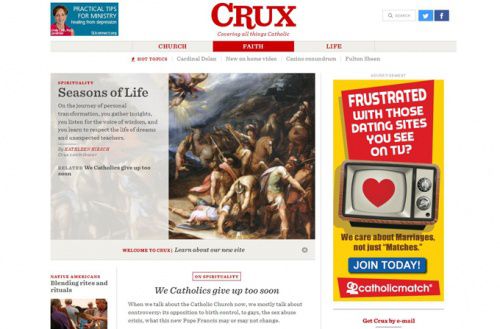A new website launched by the Boston Globe seeks to have a wide appeal in covering “all things Catholic,” focusing on reporting about the Church rather than evangelizing or aiming solely at a Catholic readership. “Those of us who are Catholic have our own reasons for consuming Church news,” said John L. Allen Jr., Vatican analyst and associate editor of the new project, “but you don't have to be Catholic, or even religious, to recognize that with 1.2 billion followers all around the world, with a rich tradition of social teaching and activism, and as the only world religion with its own diplomatic corps, the Catholic Church matters and needs to be taken seriously by mainstream news outlets.” Crux, the new site, follows a trend of websites branching off from more traditional new sources. Still, while the site caters to a specific interest group, the Globe is hoping Crux will appeal to “a broad swath of people.” According to the Globe's announcement, the website hopes to serve as a place of conversation for “active Catholics who regularly follow religious news, 'casual' Catholics who may not be regular Mass attendees, those who are simply interested in the dynamic and popular Pope Francis, and readers of all faiths who are eager to explore spirituality in general.” The website has its own staff of six editors and reporters, with contributions from leading Catholic and religious voices as well as essays submitted by readers on weekly topics. “The reporters at Crux will approach coverage from a journalistic point of view, rather than one of advocacy or evangelism. Readers can expect to see contentious topics discussed, including abortion, gay marriage and the role of women in the church,” the announcement said. Crux's staff includes Allen, a top Vatican reporter and senior Vatican analyst for CNN who recently left the National Catholic Reporter after 16 years. In comments to CNA, Allen said Crux was the brainchild of Globe owner and Red Sox owner John Henry, who views a newspaper as a place of conversation for people with varied special interests. While some news outlets raised an eyebrow at the launch of such a specified religious website, Allen said it proves Catholicism is still relevant in today's world. Boston also seems like a good place to start with such a project. As Emma Green points out in The Atlantic, as of 2012, nearly half of the population of the Boston metro area is Catholic. Pope Francis has also proven a popular source of news this year, leading to the term “The Francis Effect” for the fascination and influence the pontiff has garnered during his short time as shepherd of the worldwide fold. But despite the popularity of the current Pope, some see the launch of Crux as a risky move. The Wall Street Journal said that niche websites founded by traditional news organizations are a new way of “revitalize their ailing brands,” but they also run the risk of “diluting the paper's core readership when many newspapers have been moving to erect paywalls and encourage online subscriptions.” Crux is currently free, and might draw away customers who would otherwise pay for a Globe subscription. The Atlantic called it a “radical move”, given that the site caters to one denomination, along with the decline in numbers of people who identify as religious, especially in the millennial generation. “(I)t would be like The New York Times starting a news site just for Jews,” Green wrote in The Atlantic, referencing comments from Diane Winston, a professor of religion and journalism at USC. But the Crux staff believes the site has a place in the news world of today. “A quick internet search will show you that Catholicism is a key player in many levels, and if a secular newspaper covers every one of them, it’ll eventually run out of place for other things,” Ines San Martin told CNA. Martin, a journalist from Buenos Aires, Argentina, serves as Crux's on-the-ground reporter in Rome covering the news and events of the Vatican. Along with covering the hard-hitting news of Catholicism, the Crux also has a place for “lighter fare”, including quizzes, recipes, and the “OMG” column which serves as a sort of “Dear Abbey” for moral and ethical dilemmas on which readers can weigh in. This week's dilemma concerns the ethics of taking office supplies from work in response to unpaid overtime hours. Allen also emphasized that the goal of the Crux is not to serve merely as an outlet of Church criticism, saying “the perception that the Globe is hostile to the Church was dated even before I got there. If you ask Cardinal Sean O'Malley, he'll tell you that relations had become much better in recent years, and that my hire was just another point along that trajectory.” “Will Crux feature critical voices? Sure, because they're part of the conversation,” Allen said. “But I guarantee you, I did not get involved in this to carry water for some particular camp or faction. I got into this to make Crux the town square of the Catholic Church, where everybody, no matter their opinion or concern, feels at home.”

